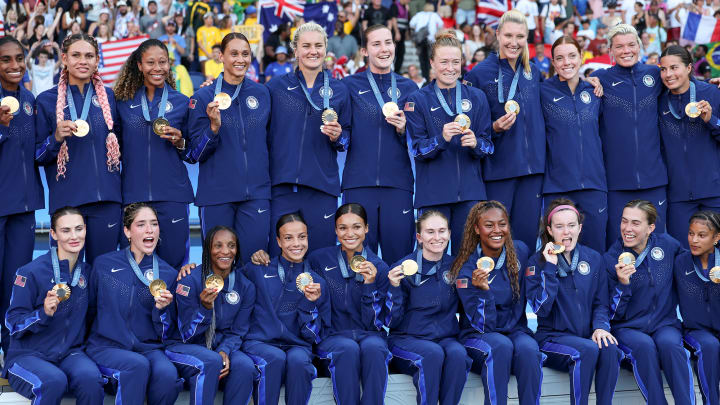USWNT Announces Its Return to the Top With Statement Olympic Gold

PARIS – The U.S. Women’s National Team did not answer every question in the Olympics. We still don’t know, for example, what these women would do if they trailed in a game. I guess we’ll have to wait until the next tournament. Or the one after that.
Or the one after that.
Mallory Swanson scored the lone goal of the final, the U.S. beat Brazil to win gold, and the Olympics served as both a competition and an announcement:
The Americans are better than back. They didn’t just win the tournament. They made their opponents ask one of the most demoralizing questions in sports: What do you do when the most talented team is also the toughest?
The U.S. allowed two goals in six games. Swanson, Trinity Rodman and Sophia Smith scored more goals in the Olympics (10) than any other team. Naomi Girma is already the U.S.’s next great defender. Girma is 24, Rodman is 22, Swanson is 26, Smith is 24—and the rest of the world just vomited.
The U.S. needed extra time to win its quarterfinal (against Japan) and semifinal (against Germany), and Brazil was probably the better team for the first half of the final. U.S. goalie Alyssa Naeher had to make a terrific save in stoppage time against Brazil… so yes, the Americans absolutely could have lost the competition. But that would not really have changed the announcement.
Emma Hayes took over as coach two months ago, and she has already instilled the resolve that is required to win events like this. Imagine what Hayes can do in two years.
“Having Emma obviously now for the long haul is going to be incredible,” veteran Crystal Dunn said. “She came in with an incredibly difficult task, but we just embraced it.”
Dunn also said this: “If we are at our best, if we are clicking, if all things are firing on all cylinders, I truly believe this team can be unstoppable. But it's not easy.”
They played like they didn’t even want it to be easy. The most successful athletes like difficult circumstances: challenging weather, tied basketball games with two minutes left, fifth sets of tennis matches. They figure that what’s hard for them will be harder for somebody else. The U.S. has had teams like that before. It has one again.
Extra time is their friend. Dunn said they understand that “it’s going to take one moment in these games,” and they need to be the ones to own it.
After the gold-medal match ended, Brazilian legend Marta gave the officials more earfuls than they had ears. Along with all of her achievements, Marta now has the distinction of losing four Olympic finals to the U.S. The first time was so long ago that the biggest name on the U.S. team was Mia Hamm.
“This young group enjoys the journey, because I think they understand now that it's not about just putting your jersey on,” Dunn said. “It's about doing the work.”
The last few years of women’s soccer suddenly feel like a weird dream. Did the disappointing Vlatko Andonovski era actually happen, or did we just imagine it? At the 2021 Olympics, Sweden looked like it had the best team in the world until it lost to Canada in the gold-medal game. Sweden didn’t even qualify for these Olympics. Canada’s spying-drone scandal has raised questions about the program’s Olympic triumph.
At the 2023 World Cup, Spain beat England in the final. Spain made the semifinal here, but England didn’t qualify.
Also: Swanson tore her patella tendon three months before that World Cup and had to miss it. She could not have salvaged the World Cup by herself. But she sure could have helped.

Five years after Alex Morgan did her tea-sipping celebration in the World Cup, Swanson, Rodman and Smith coined themselves “Triple Espresso.” The interlude between those moments seems like a blip.
The talent level around the world keeps improving. Every major tournament is going to present myriad challenges. The U.S. will not win every game. But it should win more than anybody else.
“We’re always chasing the best version of ourselves,” Dunn said. “I think we’re on this steady climb. We know winning a gold medal is obviously amazing, and we’re all gonna celebrate and soak this in. But there’s life after this Olympics.”
The weird dream is over. Triple Espresso and the U.S. just woke everyone the hell up.

Michael Rosenberg is a senior writer for Sports Illustrated, covering any and all sports. He writes columns, profiles and investigative stories and has covered almost every major sporting event. He joined SI in 2012 after working at the Detroit Free Press for 13 years, eight of them as a columnist. Rosenberg is the author of "War As They Knew It: Woody Hayes, Bo Schembechler and America in a Time of Unrest." Several of his stories also have been published in collections of the year's best sportswriting. He is married with three children.